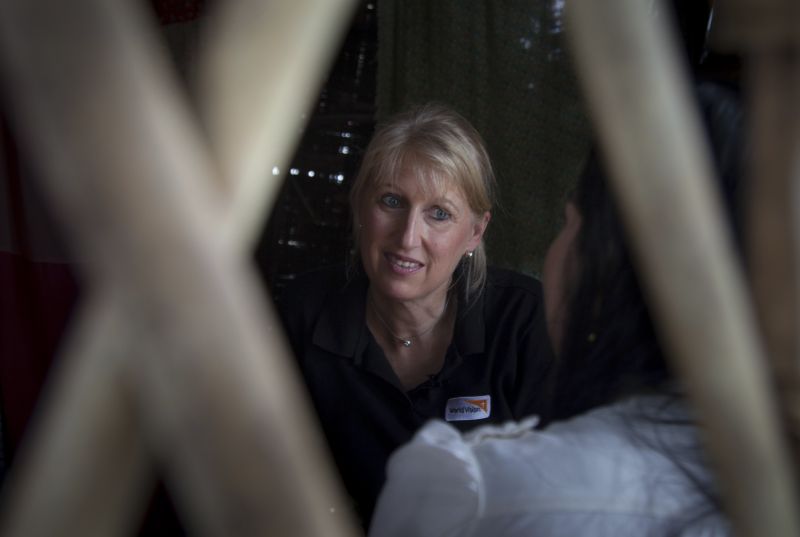Let’s Not Forget Our Sisters in the Asia-Pacific on White Ribbon Day
Thursday, November 24, 2016

World Vision’s new CEO, Claire Rogers, has called on Australians to remember their sisters in the Asia-Pacific region when campaigning for the elimination of violence against women.
Speaking on the eve of White Ribbon Day, Ms Rogers said that while one in three Australian women will experience domestic violence, the rates in the Asia-Pacific are even higher, and further complicated in many cases by patriarchal traditions.
“The figures are shocking – 46% of women in Timor-Leste have reported domestic violence in the past 12 months, and following close behind are women in Vanuatu at 44%, and in the Solomon Islands at 42%, according to recent UN statistics.”
Much of World Vision’s work in the region focuses on changing the attitudes of men and women, with the aim of both protecting and empowering women exposed to violence, Ms Rogers, who is the international development agency’s first female CEO, said.
“At World Vision we’ve had real success with the support of the Australian Government with our Channels of Hope for Gender workshops, which partners with faith leaders to drive change in deep-rooted patriarchal values.
“The results from our Solomon Islands projects are very encouraging. Since the program started in 2013, the number of women in the Solomon Islands capital, Honiara, who thought that women shouldn’t make decisions dropped away from 34 per cent to just 4 per cent.
“We were also able to start to shift the attitude of many men in the same community so that those who believed that a woman should be able to accuse her husband of rape rose from 70 per cent to 83 per cent.
One man, ‘Dani’, who participated in the Channel of Hope workshop in Honiara, told us that he’d learned some profound lessons about life through the program.
"I’ve learnt that men and women are equal,” Dani said. "Before I didn't respect other people’s views, even my family's view. But after going through the Channels of Hope training, I am now a changed person.”
Ms Rogers, who said that World Vision’s End Trafficking in Persons (ETIP) Program, funded by the Australian Government and implemented in Cambodia, China, Laos, Myanmar, Thailand, and Vietnam, between October 2011 and June 2016 – had also reported great success.
“I recently met a young woman in Myanmar who - largely through her own wit and will – had managed to escape a forced and brutal marriage after being trafficked to China. But once she had returned she still lacked both moral and financial support,” Ms Rogers said.
“This is where World Vision was able to step in and provide her both counselling and financial assistance. In her words what we had actually given her was hope, enabling her to have the courage to start rebuilding her life.”
Ms Rogers said that more than 12,000 young people had attended youth clubs over the past five years as a result of the program.
“What we have found is that these youth clubs are crucial as preventive measure which can inform those most vulnerable to trafficking of the dangers they face.”
According to ‘Li,’ a member of such a youth club in Laos, it was this knowledge that helped her protect herself at a critical moment:
“One day in the village, I was approached by someone with an offer to take me to Thailand but I refused to go and did not allow the person to contact me. I was able to refuse the offer because I had learned from youth club. If I was not with club, I might have believed the person and gone to Thailand,” Li said.
The ETIP program led to a 17% reduction in children and youth considered to be at ‘high risk’ to trafficking within communities, Ms Rogers said. “Bringing those at risk down from 26%, when the program started, to just 8% of the population.
Better still these programs were designed to be sustainable by local communities so they are continuing to educate and protect, Ms Rogers said.
“The elimination of violence against women in the Asia-Pacific is a complex and urgent task. Violence devastates lives, and the ongoing cost – morally, legally and fiscally – is unacceptable. There is much still to be done”
For interviews with Claire Rogers, contact Mary-Louise O’Callaghan: 0427 413 826 or mary-louise.ocallaghan@worldvision.com
Information on Channels For Hope for Gender, go to: https://www.worldvision.com.au/global-issues/work-we-do/poverty/tackling-gender-based-violence
Media Releases,
Asia and the Pacific,
Cambodia,
China,
Claire Rogers,
East Timor,
Human trafficking,
Laos,
Myanmar,
Solomon Islands,
Thailand,
Vanuatu,
Vietnam,
Women's Rights
Back to all Results